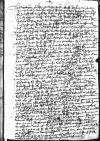Ewern Furstlichen Gnaden hab ich uff XII Octubre letst verschinen ⌊⌋, darunder dess her ⌊Echingers⌋ ⌊⌋ / und seinder Ewer Furstlichen Gnaden ⌊⌋, dess datum ⌊Leobaw⌋ den 1533-12-18⌊XVIII December1533-12-18⌋ verschinen in antwurt ⌊⌋, den 1534-08-07⌊7 Augusto1534-08-07⌋ Ewer Furstlichen Gnaden dar for geschriben, / auch woll empfangen, des inhalt vernomen. / Folgt hernach daruff antwurt. Angond die ⌊Isabel Delgada⌋ und die ⌊thochter⌋ hab ich Ewer Furstlichen Gnaden die vergangen zeit die notten geschriben, / auch Ewer Furstlichen Gnaden schreiben und willen dess halben durch den her ⌊Echinger⌋ vernomen, / sonderlich Ewer Furstlichen Gnaden jezig letst ⌊⌋, / so mir gemelter Echinger von ⌊Barcelona⌋ anzaigt hat, / daz Ewer Furstlichen Gnaden entlicher will ist, ir furo nichs mer zu geben / und sich jer nichs mer anzunemen. / Den wirt nun furo noch komen. / ⌊Si⌋ ist mir die zeit verschinen 3 stetzmit schreiben / angelegen, ob ich si nit mit gelt versechen wolt oder wie es doch ain gestalt het, / also hab ich ir Ewer Furstlichen Gnaden willen anzaigt, daz ich ir furo nichs weiters bezallen wird. / Uff sollichs ist ⌊si⌋ vergangenen tag her komen, / umm ain grond zu wissen. / Hab ⌊si⌋ mit aim ducaten, so ich ir umm Goz willen geben / hab, wider abgefergt, / ir wie ob ... Ewer Furstlichen Gnaden willen und befelch anzaigt. / Fur war, mich erbarmt nun daz gut arm ⌊thöchterlin⌋. / ⌊Die⌋ kan doch Ewer Furstlichen Gnaden nit leügnen, daz si nit ain leipliche Ewer Furstlichen Gnaden thochter seye. / Und ist zu erbarmen, daz ⌊si⌋ soll verloren werden, / dan ich sorg, die ⌊muoter⌋ aus verzweifflunng wird si verfieren. / Ewer Furstlichen Gnaden thuet vill almosen, villeicht weren diss auch ain guts almosen gewesen. / Nun aber, die weil es Ewer Furstlichen Gnaden will nit ist, billich ichs auch geschechen / lassen, / ist mir aber laid, daz mein pflegschafft dem guten ⌊thöchterlin⌋ zu gut nit bass erschiessen soll, / dan ob schon die ⌊muoter⌋ sich nit der billichait nach geholten hat, / solt dess daz gut thöchterlin nit entgelten. An 200 ducaten weren Ewer Furstlichen Gnaden wenig glegen, dar mit man die ⌊muoter⌋ versechen het ir an 25 ducaten leibding kafft, uff daz si auch nit weiter dorff im huoren leben / lassen, / oder sich dar mit verheirat, oder in ain closter gethon. / Das und die ⌊thochter⌋ von ⌊ir⌋ gnomen, der gestalt were Ewer Furstlichen Gnaden jer uff ain mal gar abkomen. / Aber die weil es Ewer Furstlichen Gnaden also nit vermaint ist, / will ich Ewer Furstlichen Gnaden dess halben mit weiter schreiben / auch nit mer bemuen. Und dess also Ewer Furstlichen Gnaden in guten anzaigen wöllen, / mit bitt Ewer Furstlichen Gnaden wöllen mirs also in guter maynung uff nemen. /
Ich hab Ewer Furstlichen Gnaden in meim letsten, dess datum xii Cotubre(!) anzaigt, wie doyl mall uff den abschid von ⌊Valladolid⌋ gemelter ⌊Isabel⌋ noch xiiii ducaten bezalt het zu jerer und der ⌊thochter⌋ underhaltunng. / Nun hab ich vernomen, wie Ewer Furstlichen Gnaden dem her ⌊Echinger⌋ seine xxxviii ducaten durch die ⌊Fucher⌋ verschafft, die er dan schon empfangen hat. / Also hab ich die ⌊Fucherischen⌋ alhie gefragt, ob si ainigen befelch von Ewer Furstlichen Gnaden haben, mir die 14 ducaten zu bezallen, befindt aber nain, / also ist mein underthenig bit, Ewer Furstliche Gnade wölle gemelt 14 ducaten den Fuchern zu ⌊Danck⌋ entrichten, / dan si mir die hie zu fraindtschafft zalt haben / laut ains besondren brieflins, so ich inen darumm geben hab, an Ewer Furstlichen Gnaden gericht. /
Und dan angond die 62 ducaten von der vergangenen rechenschafft, ist unot vill dariber zu schreiben, / dan die ⌊Welser⌋ haben die lengst fur mich empfangen, / wie Ewer Furstlichen Gnaden sonder zweifel for dissen wirt von inen bericht sein, / das si Ewer Furstlichen Gnaden dero halben geschriben, het ich die noch nit empfangen.
Dess wein ⌊desant Martin⌋ halben, / vernomen wie in Ewer Furstlichen Gnaden emp[f]angen und getroncken het. / Het leiden migen, daz er fast gut und dess vill mer gewest were. / Acht woll, wird im fass verdorben / sein, / der her ⌊Echinger⌋ und ich trincken dess stez, / sonderlich ich fur daz potengran, daz mir seid her nit mer komen ist, fur war zum dicker mal. Wan ich desse ain guten kiele schallen foll jezt bey diser hiz trinck, bin ich Ewer Furstlichen Gnaden underthenig ingedenck. /
Newer zeitung waiss ich uff dissmall Ewer Furstlichen Gnaden nicht sonders zu schreiben, dan daz wir all stond vill guter zeith von ⌊ier maiestet⌋ aus ⌊Thunis⌋ wertig seyen. / Got der almechtig lass die bald komen. / So ist die ⌊kayserin⌋ uff 23 Iunio sant Johanes anbent mit ainer ⌊thochter⌋ gelegen, / also daz wir jezt zwuo ⌊infantas⌋ haben, / und ain ⌊printzen⌋, der nit seer gesundt ist. / Was sich zu tragt, mag ich Ewer Furstlichen Gnaden her nach anzaig[en], dan der underthenigklich zu dienen bin ich alzeit willig.


